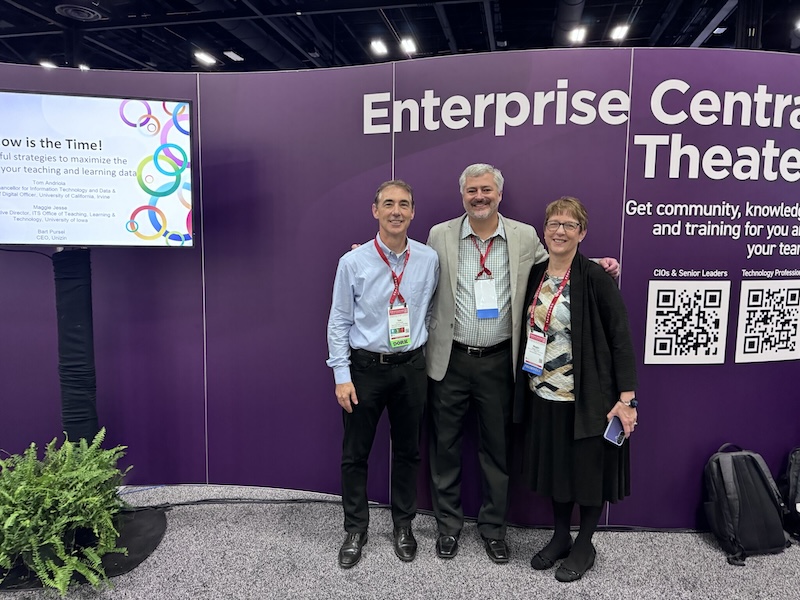
Bart Pursel
Chief Executive Officer
Unizin Field Notes from Educause 2024
Every year, the EDUCAUSE Annual Conference “connects the best thinkers in higher education technology.” This year’s conference, held in-person in San Antonio from October 21–24, and recently extending online (November 13–14) upheld that promise.
I was honored to join professionals and technology providers worldwide to share ideas, discuss challenges, and collaborate on new pathways to address the nexus of learning and technology. Unizin was well represented with consortia members Tom Andriola, Vice Chancellor, IT and Data, University of California, Irvine, Maggie Jesse, Executive Director, ITS Office of Teaching, Learning & Technology, The University of Iowa, Heather Maness, Assistant Director, Learning Analytics and Assessment, University of Florida, and Gary Chinn, Assistant Dean for Digital Learning, The Pennsylvania State University joining me for presentations and posters sessions exploring new strategies for maximizing teaching and learning data, ways to empower faculty-reflective teaching while preserving data privacy and breaking down silos to better address complex challenges.
While the Unizin presentation schedule was busy, there was still ample time to engage and learn from our assembled colleagues. What emerged was a clarion call across the academy to embrace the potential of data as a catalyst for change overall, with particular emphasis on AI.
Some reflections:
Data Defines the Educause Top 10 (https://er.educause.edu/articles/2024/10/2025-educause-top-10-restoring-trust)
The number 1 focus area in the Educause Top 10 for 2025 is The Data-Empowered Institution: Using data, analytics, and AI to increase student success, win the enrollment race, increase research funding, and reduce inefficiencies. This is the first time I can recall data ranking at the top of the list. But data is not just confined to the top spot. The next three priorities are also data-centric, including:
- #2 Administrative Simplification: Streamlining and modernizing processes, data, and technologies),
- #3 Smoothing the Student Journey: Using technology and data to improve and personalize student services), and
- #4 A Matter of Trust: Advancing institutional strategies to safeguard privacy and secure institutional data.
While learning analytics has been a topic within the Educause Top 10 for nearly a decade, data is now clearly at the center of the conversation. While Unizin members are already innovators and leaders in many of these areas, this heightened focus on data makes our work as a consortium even more relevant and important. Unizin members are using the Unizin Data Platform (UDP) to support various aspects of student success – but it is the collaborative nature of our consortium, and the willingness to share and apply solutions across institutions that sets our approach apart.
The Evolving AI Landscape
It was no surprise that Educause had many presentations, as well as edtech suppliers in attendance, focused on AI. If you’re familiar with the Gartner Hype Cycle, I think we’re still on the way to the Peak of Inflated Expectations. But there are a LOT of interesting, safe applications for GenAI to help transform our institutions.
I have not seen many vendors (yet) start to talk about mingling large, contextual and relational data (such as personally identifiable information) with some of the GenAI models. While this certainly impacts data security and trust, I also believe this will be when we start to see truly personalized, AI-driven experiences that will directly benefit our students.
Watch this space for more.
From the Digital Divide to AI Divide?
The AI discussions and presentations I attended ranged from institutions with many resources and the ability to invest heavily in local AI development and/or deployments, to small institutions with very limited budgets, still working to connect and align data from disparate platforms.
As such, we might be on the verge of an “AI Divide” analogous to the Digital Divide of years past. Institutions that can afford to prioritize AI experimentation could see a windfall of positive outcomes, while those who can’t, may fall further and further behind.
Higher education is known for collaboration. It’s my hope that we find ways to avoid this potential AI divide and help institutions of all sizes leverage data and AI to the benefit of all students, faculty, and staff.
For many of us, the higher ed technology conversation is decades old. For our colleagues, however, it is just getting started. Technology is no longer an insular domain, shrouded by ones and zeroes or hidden behind servers and software. The potential of learning data to improve student outcomes, optimize curricula and help instructors do what they do best even better is being discussed across our campuses – from classrooms to administration buildings. It’s up to us to demystify data, reality-check expectations about what technology can and cannot do, and help build the guardrails to ensure the equitable, effective, and ethical use of data in service of students and their success.

